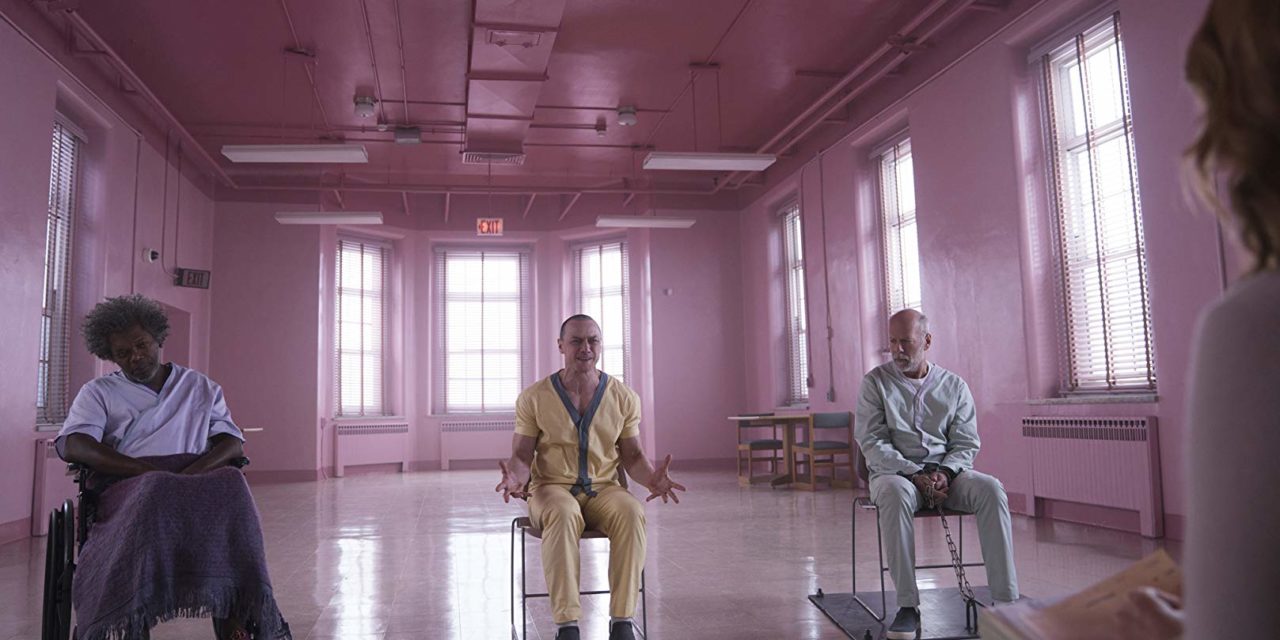By Nicole Fernandez | Staff Writer
The ending to the “Eastrail 177 Trilogy” has finally arrived with “Glass.” M. Night Shyamalan has yet again added another successful soon-to-be classic in the same vein of “The Sixth Sense” (1999) and “The Visit” (2015), continuing what seems to be an upward trend in his film quality lately. “Glass” was an exhilarating journey to watch, causing several instances of intense anxiety. I was on the edge of my seat the entire time.
“Glass” finds a return of BAFTA Awards winner James McAvoy as Kevin Wendell Crumb, a young man who suffers from dissociative identity disorder (DID). The lone antagonist of 2016’s hit “Split,” he is now joined by Elijah Price, or Mr. Glass, played by BET Awards winner Samuel L. Jackson from 2000’s “Unbreakable.” Bruce Willis’ character also makes his reappearance as David Dunn, an incredibly strong and invulnerable vigilante hero.
As proven in the previous movie, James McAvoy is one of the greatest, versatile actors of this decade. His performance was the main attraction. The skill at which he transitioned between each personality so abruptly was fascinating, and it was impossible to look away. He made me believe in each person in his head. They were small changes, but they were vital in creating completely different personas. My favorite individual had to be “Hedwig,” the nine year old personality. He provided the comic relief in an otherwise dark, mysterious film.

Samuel L. Jackson in his iconic purple suit made famous in “Unbreakable.” (Photo courtesy of Universal Pictures)
On the other hand, Samuel L. Jackson, the shady figure who seems to have a hand in everything, was not as titillating to watch. Jackson’s return as Elijah Price, or Mr. Glass, had been hotly awaited for, but it was ultimately underwhelming. His character was infamous for his brilliant mind that he used to plan mass murder, yet most of the deaths were not by his hands. The same could be said for Bruce Willis’ character, who was barely a contender against the “Beast.”
Anya Taylor-Joy, a Cannes Film Festival winner, also reprised her role as Casey Cooke, the sole survivor from being kidnapped by Crumb’s 24th personality, the cannibalistic “Beast,” in the second film. Unlike before, she was not just a victim, however. Casey served as a vital player in conversing with Crumb and trying to keep him in the light, or in control of his own body over the other personalities.
A newcomer to the series is Golden Globe winner Sarah Paulson who played Dr. Ellie Stapler, the psychiatrist tasked with attempting to cure Mr. Glass, Kevin, and David Dunn of their superhero/supervillain complex. Her part was generally unremarkable, besides revealing the classic Shyamalan twist ending.

M. Night Shyamalan wrote and directed his latest film, and even made a cameo appearance as a store customer. (Photo courtesy of Universal Pictures)
Shyamalan’s cinematography was full of symbolism, clever subject centering, and even direct eye contact with the camera. That made for some interesting moments in which the audience was forced to meet the characters soul-piercing gazes. Although most of them were practically background compared to McAvoy, they were still memorable because of their roles in the striking universe Shyamalan has created.
“Glass” was a strange rollercoaster ending to this exciting trilogy. My eyes were glued to watching the unfolding events. The best part was James McAvoy and his ability to transform into distinctive men and women of varying ages. Despite a few questionable moments, I would definitely watch this several times over.







Hy there, a virtuouspropose
Are you in?
http://bit.ly/2HnTL8b